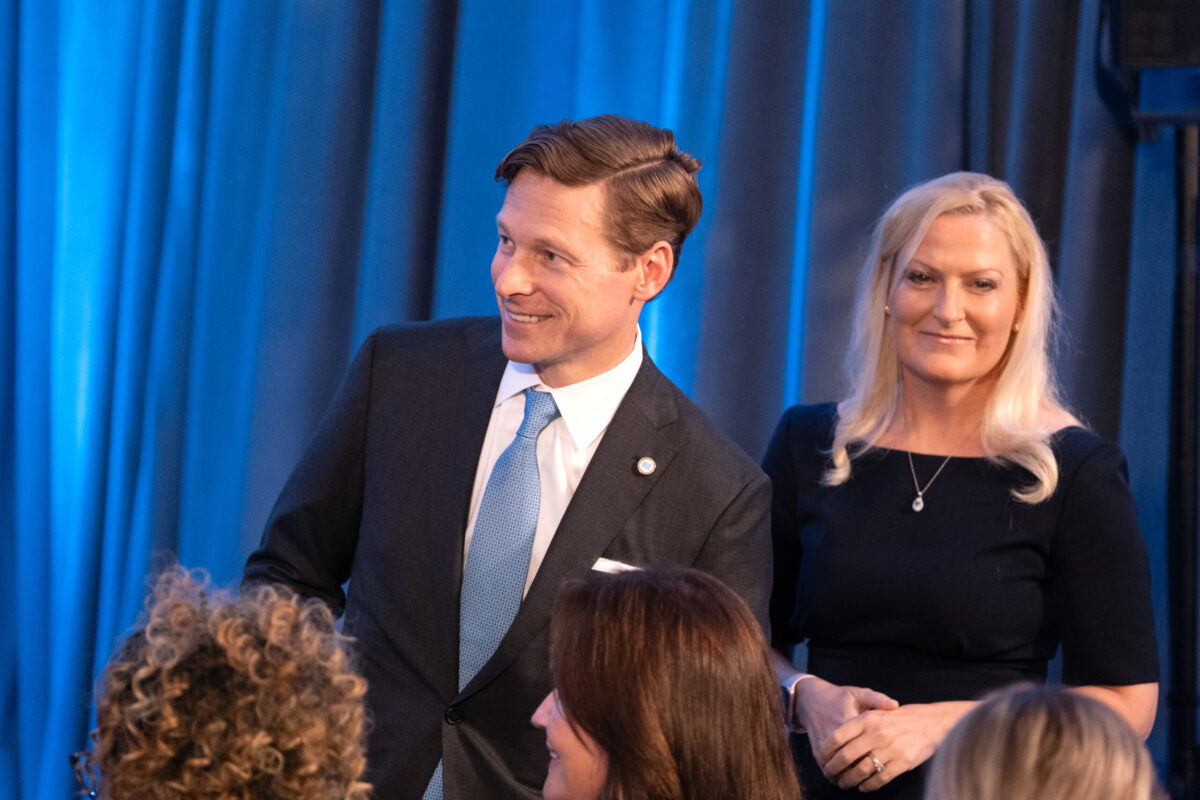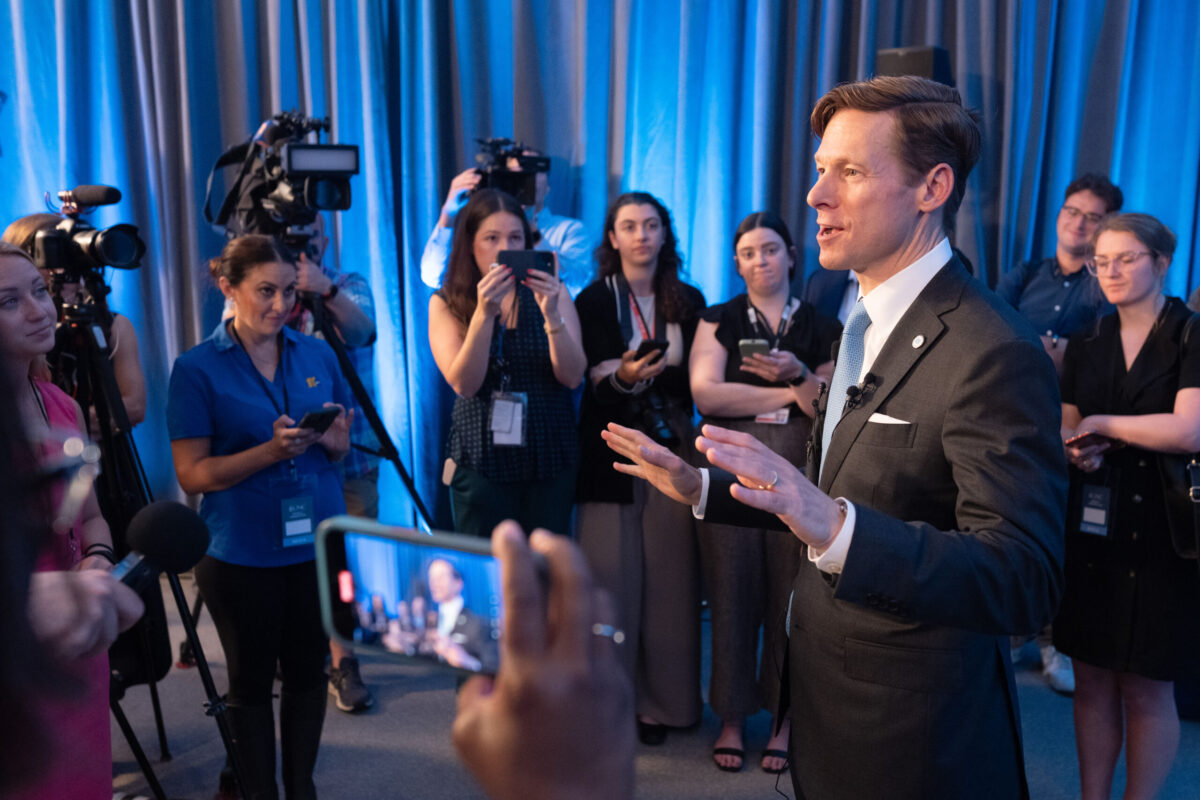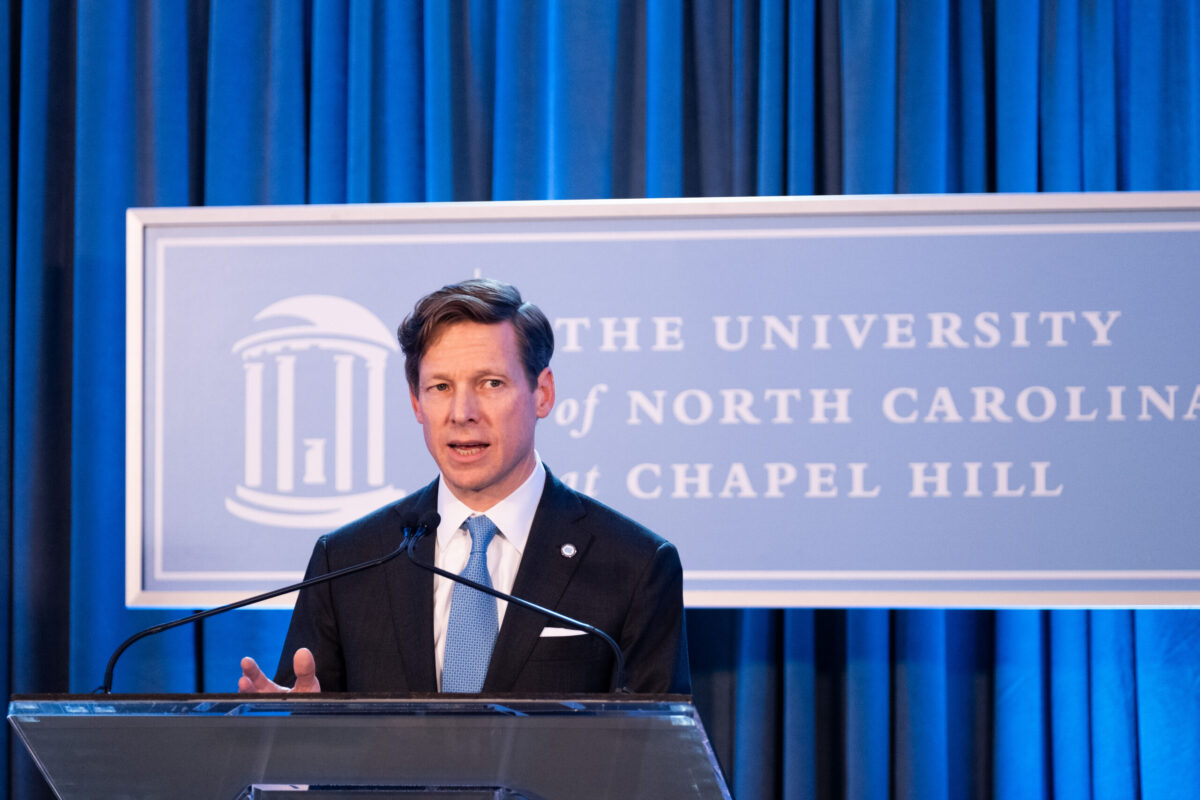Roberts Next UNC Chancellor
Posted on Aug. 9, 2024
UNC Chancellor Lee H. Roberts is greeted at a Chancellor acceptance event held at the Kenan Center. (Photo: UNC/Jon Gardiner ’98)
Lee Roberts was named today the 13th chancellor of UNC, after serving in the role on an interim basis since January, an appointment that some observers said was expected.
He was formally announced during an afternoon event at the Kenan Center, ending speculation over who would replace former Chancellor Kevin Guskiewicz, who resigned in January to become president of Michigan State University.
UNC System President Peter Hans ’91 presented Roberts’ name to the UNC Board of Governors for approval Friday morning. It is not clear how many finalists there were for the position.
During his remarks, which lasted just under six minutes, Roberts said he’s been impressed with UNC’s excellent faculty, the love people have for the University and its global reputation. While addressing a crowd of about 50 people, he promised to be guided by the principle of public service as a key mission of the institution.
Roberts took media questions after leaving the podium and spoke about people’s love and devotion to UNC. “As I’ve spent more time on this extraordinary campus, I realize it’s the kind of love that continues to grow on you,” he said.
“Every era is unique in its challenges and the possibilities it presents, and as a result, every chancellor search is different,” Hans told the Board of Governors before their vote on Friday. “We have found the right leader for this moment in Carolina’s history because the questions facing public higher education are wide ranging, enormously complex and likely to become magnified in the years ahead.”
The election of a new chancellor was quicker than expected. Hans had said in March when a search committee was formed to find the next chancellor that he expected a decision by the end of the year, but the committee canceled a second round of public listening sessions planned for this fall, with search committee Chair Cristy Page ’96 (’02 MPH, ’02 MD), executive dean of the School of Medicine, chief academic officer of UNC Health and a tenured professor in the medical school’s department of family medicine, saying last month the committee collected enough public input in the spring and from an online survey that generated more than 2,700 responses.
Although Roberts repeatedly declined over the months to say whether he was pursuing the permanent position, some believed he had the inside track to be the next chancellor because Hans appointed him as interim, and he’s a former member of the Board of Governors.
Roberts was asked whether he worried about some people questioning if he had “a leg up” in the chancellor’s search because two prominent state legislators had said in early May they thought he deserved the position due to his handling of campus protests over the Israel/Palestine conflict. Roberts said he didn’t know whether their endorsement gave him an advantage and each candidate had strengths and attributes.
“I’ve been in the state for a long time and have relationships from my time as budget director and otherwise,” said Roberts, who served as state budget director under Republican Gov. Pat McCrory. “Hopefully that is helpful to Carolina and what we’re trying to do.”

UNC Chancellor Lee H. Roberts answers questions from the media. (Photo: UNC/Jon Gardiner ’98)
Shortly after assuming the interim chancellor’s position, Roberts said one of his primary goals would be managing a seamless transition and ensuring students, faculty and staff have the resources they need. He also said he would focus on improving campus safety in light of the Aug. 28 shooting death of a University professor that sent the campus into lockdown for several hours.
In a campus email March 20, Roberts outlined creation of four committees to focus on key priorities for the University: enrollment planning, physical master plan, Applied Science and Generative AI. Committees must submit recommendations to Roberts by Sept. 1.
During his time as interim chancellor, Roberts endured some tense moments on campus, including the April 30 arrest of six pro-Palestinian protestors who failed to remove tents they’d erected on Polk Place in front of South Building. Of them, three were Carolina students and three were nonaffiliated with the University.
Later that day, some protestors returned to Polk Place and removed the American flag from the pole in the middle of the quad and replaced it with the Palestinian flag, a move Roberts said was “antithetical to who we are and what this University stands for” as he stood on the steps of South Building. He added, “That [American] flag will stand here as long as I’m chancellor.”
Roberts has also faced questions about diversity, equity and inclusion after the UNC Board of Governors in May voted to repeal and replace the diversity, equity and inclusion policy it had enacted in 2019. He will have to continue to oversee the implementation of the new policy, which has drawn both praise and criticism from alumni.
Roberts on Friday reiterated his support for Project Uplift, which works to increase access to higher education for high school students, in particular those who are underrepresented in postsecondary education. Project Uplift has operated out of UNC’s Office of Diversity and Inclusion, and some feared the program could be shuttered because of the UNC System’s new DEI policy. “That program’s not going anywhere,” he said. “In fact, I’d love to see it expanded and enlarged.”

UNC Chancellor Lee H. Roberts makes remarks.
(Photo: UNC/Jon Gardiner ’98)
Roberts did not say whether the University’s DI office, along with the initiatives and programs it oversees, will remain. University officials have to report back to the system office by Sept. 1 about their implementation of the policy, and Roberts said the University will meet the deadline.
Roberts said he’s established a good rapport with Chair of the Faculty Beth Moracco ’92 (MPH, ’99 PhD) and isn’t here to tell faculty how to do their jobs. “I know that they know what they’re doing,” he said. “My job is to support the faculty and make sure that they have the resources.”
Moracco, a member of the search committee, said she supports Roberts as the choice for Carolina’s next leader. “The search elicited a large, well-qualified pool of applicants,” she told the Review. “Now that President Hans has made his choice, the faculty, through faculty governance, through the faculty council, and the elected and appointed committees of the faculty, are eager to engage in meaningful and shared governance with Chancellor Roberts.”
Moracco said Roberts has a steep learning curve “as someone with no prior experience in public higher education” and faces numerous important issues, including free speech and NIL. Roberts said by this time next year University leaders will need to identify how they’re going to fund “the additional NIL money, the 22 percent that’s going to require some revenue enhancements, figuring out ways to generate more revenue.” He added the University “will probably have to cut some areas of our athletics budget.”
— Laurie D. Willis ’86 and Cameron Hayes Fardy ’23
